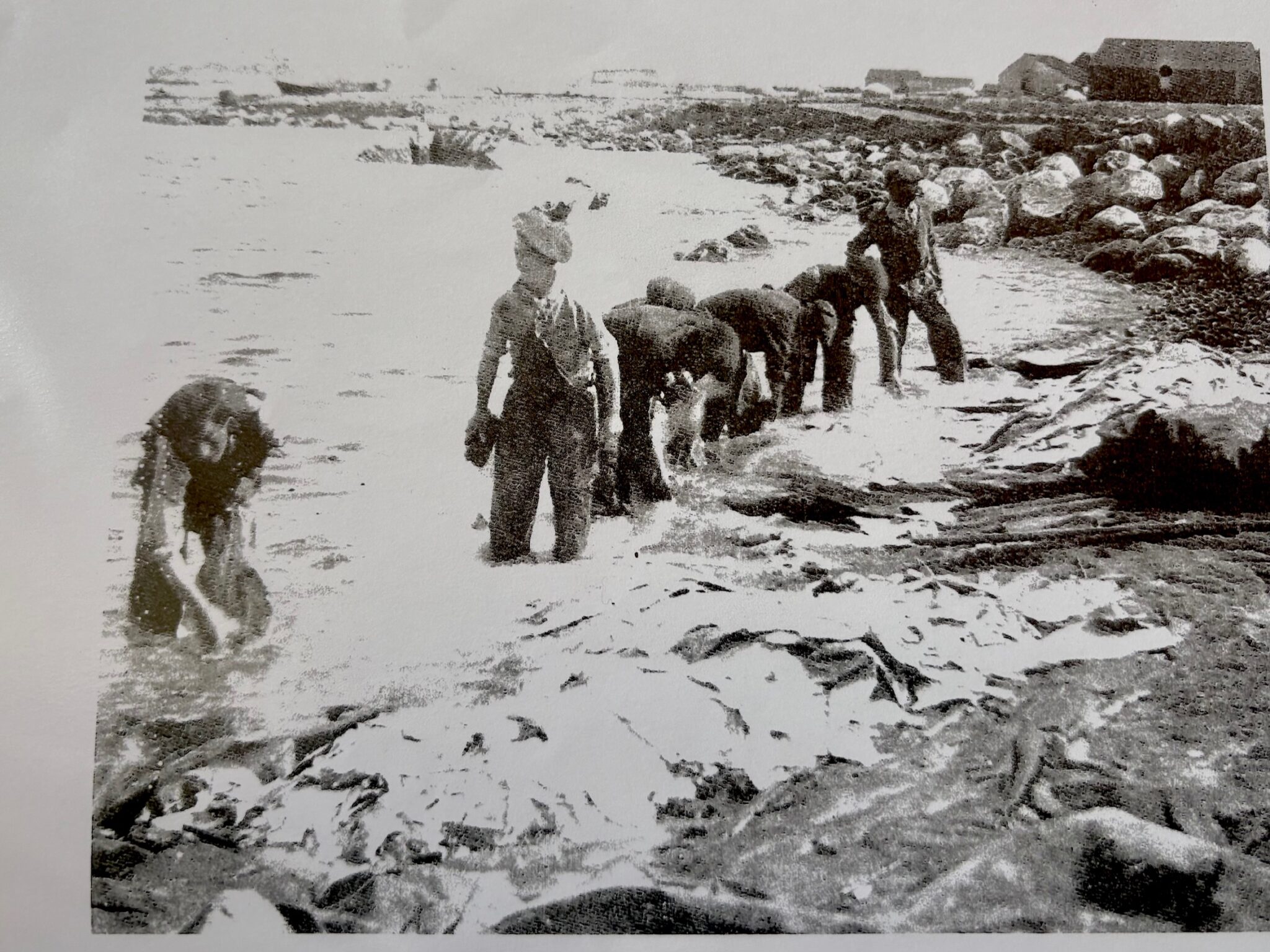Trinity Church in the City of Boston
The Rev. Morgan S. Allen
November 9, 2025
XXVII Pentecost, Luke 20:27-38,45-21:4
In you, O Lord, have we taken refuge; for the sake of your name, lead us and guide us. Amen.
Our son, Michael, is studying in France for this fall semester, and week-before-last, my wife, Missy, and I had the opportunity to visit him. As it happens, the American Cathedral in Paris is between Deans at present, and the Bishop of The Episcopal Church’s European “Convocation” invited me to teach and preach as part of our trip. As a swap, the bishop provided us use of the Deanery, an apartment on the Cathedral campus large enough for Michael to stay with us. A wonderful treat, that space allowed us to recreate a kid-come-home-from-college break week, including pizzas and piles of laundry.
Though we did make it to Sainte-Chapelle, the Eiffel Tower, and the Louvre, be sure: we traveled the Atlantic to see our beautiful boy – to hold him tight – and for me, the City of Light was mostly incidental to that priority. Accordingly, we saw Michael Allen’s Paris: we ate at the boulangeries he had identified for the best-value, ham-and-butter baguettes; we toured his home-stay apartment and traced his walk to school; we made time to hit a couple record stores he has frequented, and we splurged to see Erykah Badu in concert.1 Who happened to be marking the 25th anniversary of her piece-de-resistance, Mama’s Gun. And maybe the highlight of the whole trip for me, at night we laid in bed Charlie-And-The-Chocolate-Factory style [if you can picture Grandpa Joe with his sleeping cap], watching on a laptop the French-New-Wave movies that would appear on Michael’s film-class’s mid-term exam.2 I learned that Director François Truffaut imagined Michel from Breathless (1960) as Antoine from The 400 Blows (1959) having reached adulthood.
![]()
Today’s Gospel appointment begins with Jesus encountering the powerful Sadducees. While we can surely read their question of Jesus as an attempt to corner the teacher, Jesus responds to what lies underneath their trap – and invites our focus there, as well. Jesus aims his answer at the temple leaders’ concern for station and luxury, a covetousness their hypothetical unwittingly hints. He answers: When love reigns, the questions you ask and the statuses you guard, they will have no meaning in the gracious fulfillment God invites all people to enjoy.
The authoring community of Luke’s Gospel reinforces this focus and builds on Jesus’ exchange with the familiar,3 Familiar from the other synoptics, we read the Matthean version on Ash Wednesday (Mt. 6:1-6,16-21). Ash Wednesday warning: “Beware of the scribes, who like to walk around in long robes …” Again, Jesus calls the crowds to sincere devotions, rather than superficial distractions – calls the faithful to live for the marrow of existence rather than mere passing comforts. Notable in this context, God need not deliver any “greater condemnation,” for the performatively pious will choose for themselves their meager “rewards.”
Continuing with this momentum and these calls for sincerity, then the parabolic story of “The Widow’s Mite” follows.
![]()
 Late in our week together, we trained to Bretagne for a three-day visit with my Uncle Paul, Aunt Bernadette, and cousin, Emma, at their home in Saint-Quay-Portrieux. And – Lord, have mercy! – our family spoiled us: every day, three table settings of croissants and cheese; chocolate and homemade caramel; tomato pie, galettes, and crepe, Crepe, CREPE! As All Saints approached, we gathered in the town square for a Samain festival, a syncretistic, Celtic and Christian celebration of the seasons’ turn, and enjoyed everything from apple-cider presses and traditional dancing, to fire breathers and (some very American) Halloween costumes.
Late in our week together, we trained to Bretagne for a three-day visit with my Uncle Paul, Aunt Bernadette, and cousin, Emma, at their home in Saint-Quay-Portrieux. And – Lord, have mercy! – our family spoiled us: every day, three table settings of croissants and cheese; chocolate and homemade caramel; tomato pie, galettes, and crepe, Crepe, CREPE! As All Saints approached, we gathered in the town square for a Samain festival, a syncretistic, Celtic and Christian celebration of the seasons’ turn, and enjoyed everything from apple-cider presses and traditional dancing, to fire breathers and (some very American) Halloween costumes.
My aunt grew up in this area, and during summers she stayed with her grandmother on the fishermen’s side of the port. These beaches and byways remain rich with her memories and sense of home, and her delight in sharing her community with us – you know, that special joy of someone you love and admire, sharing something they love and admire – that joy has lingered gladly with me since our return. Among the stops we made together, Bernadette took us to Chapelle Sainte-Anne in Portrieux, where she serves as a volunteer tour guide.
In this historic fishing village, that chapel provided an altar where families could light candles and pray for the mariners who would leave in February of each year to fish la grand peche in Newfoundland. For three centuries – from the 1600s to the 1920s – these annual expeditions sent 20 sailing boats, each with 500 fishermen, to cross 2,500 miles of Atlantic Ocean. Included in these journeys were loving parents’ beautiful boys: in 1841 the minimum age was 8-years-old; in 1874, 10-years-old; and in 1907, 15-years-old.4 Details gleaned from my aunt’s tour and a follow-up call with her last week.
Bernadette’s grandfather was among the teenaged cohort at the turn of the twentieth century who worked the eight-month expeditions. The more senior men would fish, and the boys would clean the peche. The children would lay the cod to dry on les graviers, the pebble beaches of North America. They would salt the fish, and then store the catch in the hull of the ships – where it would keep until their return home.5 Before I complain about my Boston commute, I will imagine these sights, sounds … and smells.
These commissions proved perilous, and many died in their service. In the thirteenth century, the townspeople built an oratory dedicated to Saint-Clément – Pope Clement I, the patron saint of fishermen. In the fifteenth century, a chapel replaced that oratory, dedicated as Saint Anne de Naufrages, “for those who died at sea.” And, in 1770, the chapel’s footprint increased once more to its current size – roughly the area under one transept gallery here at Trinity.
![]()
As the Gospel continues, Jesus looks up from his teaching to see “rich people putting their gifts into the treasury.” As we know of that story, “he also saw a poor widow put in two small copper coins.” Upon witnessing this woman’s gift, Jesus declares, “Truly I tell you, the poor widow has put in more than all [the rich patrons]; for [they] have contributed out of their abundance, but she out of her poverty has put in all she had to live on.” Once more, Jesus calls for sincerity in one’s devotions – calls for an alignment of one’s convictions, one’s claims, and one’s actions.6 Here, I imagine “convictions” as the beliefs we carry within us, and “claims” those beliefs we profess.
![]()
To fund the Portrieux chapel expansions and to furnish that worship space’s interior, the fishermen worked Sundays and gave all their Holy Day catch to the cause. They named their Sunday contributions, la part à Dieu – “God’s share.” From those long-ago days to my Aunt Bernadette’s telling of the story last weekend, pride in those commitments has endured the centuries since – shaped an entire community’s identity, generation upon generation.
In the light of baroque windows, the chapel’s décor once included many model boats suspended from the ceiling, and several of those models now occupy glass cases set along the nave’s perimeter. Most moving to me, the reredos features a 1777 painting of Saint Anne and Saint Joaquim reading to their adolescent daughter, Mary. Above and behind the Virgin’s shoulder, a boat sails across the Bay of Portrieux: a powerful understanding of how our Christian inheritance calls us to paint ourselves into the story of our faith and, likewise, to recognize our forebearers still making their way in the world about us.
While Missy, Michael, Ginna, and I have other charitable interests, Trinity Church always receives our first and best gift – as it should be. And the condition of the world these days has more fully unvarnished my eagerness to support the Church: I have never been more ready, never felt more grateful for the privilege to make my pledge than I am right now. For my family and me, this means sacrificial, financial giving, and I hope you will consider whether God might call you to the same.
See, by our pledges, we share in the beauty of these Sundays – from the sparkle of our stained glass, to the stewardship of our stonework, to the glory of our choirs.
By our pledges, we share in our parish’s ministries of feeding and formation, consolation and commission of the Good News into a hurting world.
By our pledges we share in a congregation growing in number and in belovedness, including the 52 adult baptisms, confirmations, receptions, and reaffirmations we celebrated last month – a cohort that included pew neighbors from 6 countries and 18 states, born in every decade since the 1930s – including the current one, if we include one confirmand’s infant daughter who was baptized last Sunday on All Saints.
Friends, our public Stewardship season will conclude next week; let us dare honesty with ourselves and with one another. As today’s Gospel observes, too often, the more we have, the less we give. Jesus challenges us and any who would present themselves as heroes for “sacrifices” that, at the end of the day, simply do not cut as deep or carry the consequence we claim of them.
You will find a pledge card paperclipped to your worship booklet, or you can link to the confidential web form through the QR code on the same. Consider: Hebrew tradition asks for the tithe, ten percent of one’s income. The Portrieux fishermen contributed one-seventh of their life and labors. And the poor widow? She gave everything she had. How generously does God call you to give?
Trinitarians, if you have not already, this is the place and now is the time for you to make your 2026 pledge. If you have made that commitment, thank you …. and have a second look at it. For all of us: how can our pledge move us toward the marrow of existence, rather than mere passing comforts? Does our commitment align our convictions and our actions?
By our faithful pledges, we can paint ourselves into that imperfect, holy tableau of souls who truly sacrificed – widow and wealthy alike, from the coasts of France to the Back Bay of Boston – who kept upon the high road and made possible all our inheritances, near and far. Let us join with them and with God, and let us choose the Church for sharing ideas grander than fleeting memes … for narrating stories with horizons further back than this empire … and for pursuing those shores before us more glorious than our grandest hopes can imagine. What a privilege – what a delight! – to make a pledge to Trinity Church.
I pray for grateful hearts and gracious lives,
Amen.
